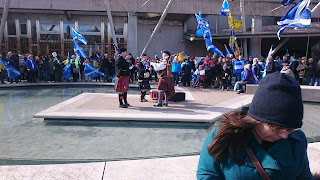On HOOP, and hope.

Secondly, we can pull out a big crowd in Edinburgh at short notice on a weekday afternoon. That shows there's a huge appetite to get the Yes movement rolling again.
Thirdly, the average age was about 60. That's not surprising — it was in working hours, many folk with day jobs couldn't be there. But it proves that the idea the old aren't keen on independence is havers.
Now is the time

There's a trope in early Hollywood: a girl, bound to railway tracks, an oncoming train. That's the situation we're in now: Brexit is the oncoming train, and our Scotland, our Bella Caledonia, is bound to the tracks.
But with what are are we bound? With chains? No: with caution, with timidity. Folk are saying that is isn't certain that with one bound we'll be free. They're right, of course. Folk are saying if she tries to bound free, and fails, we cannae try again for a generation.
On Catalunya, and Freedom
 I don't know much about Catalunya. I've never been there; I have no friends from there. I've read, obviously, books coming out of the experience of the Spanish Civil War — George Orwell, Laurie Lee, and anarcho-syndicalist texts: Murray Bookchin, Robert Alexander and others. But that's all a long time ago; and my interest was in political theory and in how you build a good society, not particularly in the place itself. I don't know much about Catalunya.
I don't know much about Catalunya. I've never been there; I have no friends from there. I've read, obviously, books coming out of the experience of the Spanish Civil War — George Orwell, Laurie Lee, and anarcho-syndicalist texts: Murray Bookchin, Robert Alexander and others. But that's all a long time ago; and my interest was in political theory and in how you build a good society, not particularly in the place itself. I don't know much about Catalunya.
But that is beside the point. The point, in Catalunya now, is the right of people in a place to define themselves as a community and a polis, and to achieve self determination for that polis. Chapter One, Article One of the Charter of the United Nations — which all members have signed up to — asserts the right to self determination. So does Article One of the International Covenant on Civil and Political Rights, of which Spain is also a signatory. It is a basic, fundamental right.
And it is a right we in Scotland claim. It is core to our Claim of Right. It is core to our right to choose whether we wish Scotland to become a nation again.
Wildwood: Development
*[What follows is the text of the 'Development' chapter — chapter five — of my thesis as it existed in June 1988, when I lost access to the machine on which the work was done. This is an unfinished chapter of an unfinished thesis; I am posting it because people have expressed interest in the explanation game. This is the last form of this chapter, but it isn't the end of my thinking on the matter, and if I were rewriting it now I would add further moves to the set to allow the agents to argue not just about assumptions, but about the merit of the authorities from whom rules of inference are drawn. * ** A modern implementation would also, of course, have access to the semantic web in order to draw in additional sources of knowledge beyond that stored in a local knowledge base.]
Explanation is a social behaviour
Games are social behaviours which can be modelled
Before Wildwood: the Arboretum engine
(this piece was written as an email in a response to a question by Chas Emerick about whether it is possible to explain inference to ordinary people. It describes the Arboretum engine, which started me thinking about how you make a computable logic which people can understand.)
Right, let's try to set this out in some sensible detail. I'll start by giving you the bones of the story, and then move on to talk about the things you're actually interested in. I'm copying Peter Mott in so he can correct any misrememberings of mine (I have long term severe depression, and it really messes with your memory).
I did a minor course in logic and metaphysics when I was an undergrad. When I graduated in 1986, my logic tutor, Peter Mott, who was entirely deaf, was invited to join an AI project — the "Alvey DHSS Large Demonstrator" essentially as the formal logic input to the process. He invited me to join him as his research associate, mainly I think because having been in his seminars for two years I was pretty fluent at discussing technicalities of logic in sign language, and could interpret for him. I was never the world's most brilliant logician, but I could more or less do it.
